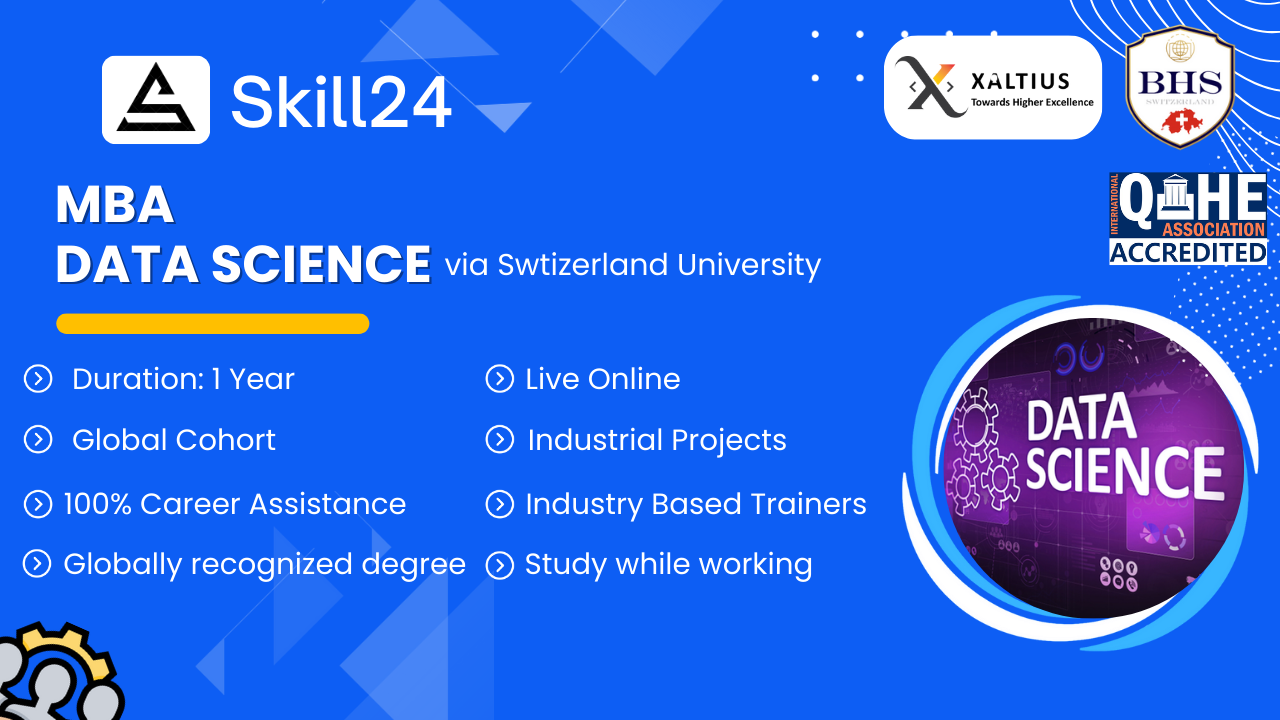Subtotal: $318.00

Unlock the potential of data and become a driving force behind strategic decisions with our MBA in Data Science program at Business & Hospitality School Switzerland (BHS Switzerland) Online. Here's why our program stands out:
Program Highlights:
- Global Recognition: Over 1,000 companies across Europe and internationally have endorsed our graduates, offering a testament to the global recognition and value of our MBA in Data Science.
- Global Reach: Our students explore opportunities in 118+ countries, creating a diverse and enriching educational experience.
- Impressive Placements: Achieve your career goals with a remarkable placement rate of 96.07% in 2022-23, showcasing the high demand for our data science graduates in the global job market.
- International Faculty: Benefit from the expertise of our faculty, with 1,300+ members representing 30+ countries. This diverse faculty ensures a global perspective and insights into the ever-evolving field of data science.
- Personalized Learning: Enjoy a student-faculty ratio of 12:1, providing a personalized pedagogical approach that fosters your academic growth.
- Digital Learning Community: Join a community of 1.2 million continuous learners who have registered in one of our Massive Open Online Courses (MOOCs), staying at the forefront of advancements in data science.
Be the Power Behind the Decisions:
- Sophisticated Thinking: Develop advanced technical and mathematical skills to unravel complexities and make sense of data, positioning yourself as a valuable asset in an era where businesses rely on data-driven decision-making.
- Versatile Skills: From advanced statistics and machine learning to programming and database systems, our program equips you with skills applicable across all industries, preparing you to redefine questions and provide impactful answers.
LinkedIn Profile Enhancement:
- Top-Ranked University: BHS Switzerland is ranked among the top universities in Europe for Hospitality & Tourism, Mathematics, Economics and Econometrics, Computer Science, and Information Systems.
- Flexible Learning: Experience the flexibility of online learning while benefiting from the intellectual strength and commercial experience of our faculty. Graduate sooner with the in-demand skills that the industry requires.
- Postgraduate Success: Full-time postgraduate coursework students had a median salary of $125,000 three years after graduating, emphasizing the significant return on investment for your postgraduate qualification in Data Science from BHS Switzerland.
Create Business and Personal Opportunities:
- High-Demand Skills: Specialize in areas such as machine learning, database systems, or statistics based on your desired career path. Our program is designed to deliver skills in high demand and difficult to find.
- Dynamic Career Paths: Whether you envision a career in machine learning, data analysis, or roles yet to be imagined, our foundational and specialized skills open doors across industries, creating a dynamic and potential-filled career.
Choose BHS Switzerland for your MBA in Data Science and position yourself at the forefront of the data-driven revolution. Explore, learn, and unlock a world of opportunities.
Why Skill24?
Learn from the greatest faculty around the world.
| USER | TOP-RANKED PROGRAMS | HIRING PARTNER | BEST FACULTY |
| 25000+ | 10 | 250+ | 500+ |
We Assure You of Job Assistance at the End of the Program.
|
|
|
|
|
|
|
|
|
|
|
|
|
|
|
|
|
|
|
|
|
|
|
|
|
DETAILED CURRICULUM
Foundations of Business and Management (6 ECTS)
Topics Covered:
- Introduction to Business Ethics and Corporate Social Responsibility.
- Principles of Microeconomics and Macroeconomics.
- Basics of Marketing Management and Market Research.
- Essentials of Financial Management and Accounting.
- Fundamentals of Organizational Behavior and Leadership.
Learning Outcomes:
• Understand the ethical and social responsibilities of businesses.
• Comprehend economic principles and their impact on business decisions.
.• Acquire basic marketing and market research concepts.
• Gain insights into financial management and accounting practices.
• Develop foundational knowledge of organizational behavior and leadership.
Business Analytics Fundamentals (6 ECTS)
Topics Covered:
Introduction to Business Analytics and Its Applications.
- Descriptive Statistics: Measures of Central Tendency and Dispersion.
- Inferential Statistics: Hypothesis Testing and Confidence Intervals.
- Probability Distributions and Sampling Techniques.
Learning Outcomes:
• Recognize the importance of business analytics in decision-making.
• Calculate and interpret descriptive statistics for data analysis.
• Apply inferential statistics to make informed business decisions.
• Understand probability distributions and their role in modeling uncertainty.
Programming for Data Science (6 ECTS)
Topics Covered:
Introduction to Python and R Programming Languages.
• Variables, Data Types, and Basic Operators.
• Control Structures: Loops and Conditional Statements.
• Functions, Libraries, and Packages for Data Analysis.
Learning Outcomes:
Gain proficiency in using Python and R for data manipulation. Write code to handle variables, data types, and basic operators.
Develop control structures to implement loops and conditional statements.
Utilize functions, libraries, and packages for data analysis tasks.
Data Management and SQL (6 ECTS)
Topics Covered:
Introduction to Databases and Database Management Systems (DBMS).
Relational Database Concepts and SQL Fundamentals.
Querying Single and Multiple Tables using SELECT Statements.
Data Manipulation: Insertion, Updating, and Deletion.
Data Integrity, Normalization, and Indexing
Learning Outcomes:
• Understand the role of databases and DBMS in data storage.
• Create and manage relational databases using SQL
• Formulate queries to retrieve and manipulate data from databases.
• Ensure data integrity through normalization and indexing techniques.
Data Visualization and Interpretation (6 ECTS)
Topics Covered:
• Importance of Data Visualization in Business Decision-Making.
• Tools for Data Visualization: Excel, Tableau, Power Bl.
• Design Principles and Best Practices for Effective Visualizations.
• Creating Charts, Graphs, and Dashboards.
• Interpreting and Communicating Insights from Visualizations.
Learning Outcomes:
• Recognize the significance of data visualization in conveying insights.
• Utilize tools like Excel, Tableau, and Power BI for creating visualizations.
• Apply design principles to create clear and impactful visual representations.
• Develop skills in interpreting and effectively communicating insights from visuals.
Statistical Analysis for Business (4 ECTS)
Topics Covered:
• Exploratory Data Analysis (EDA) Techniques.
• Descriptive and Inferential Statistics for Business.
• Hypothesis Testing: T-tests, ANOVA, Chi-Square.
Regression Analysis: Linear and Logistic Regression.
• Practical Application of Statistical Concepts in Business Scenarios.
Learning Outcomes:
• Apply descriptive and inferential statistics to business datasets.
• Conduct hypothesis testing using various statistical tests.
• Understand and perform regression analysis for predictive modeling.
Machine Learning Fundamentals (4 ECTS)
Topics Covered:
• Introduction to Machine Learning and Its Applications.
• Supervised Learning: Regression and Classification.
• Unsupervised Learning: Clustering and Dimensionality Reduction.
• Model Evaluation, Bias-Variance Tradeoff, and Cross-Validation.
• Practical Implementation of Machine Learning Algorithms.
Learning Outcomes:
Comprehend the principles and applications of machine learning.
Differentiate between supervised and unsupervised learning techniques.
Evaluate model performance and manage the bias-variance tradeoff.
Implement common machine learning algorithms on business datasets.
Advanced Machine Learning and AI (4 ECTS)
Topics Covered:
• Advanced Regression Techniques: Lasso, Ridge, Elastic Net.
• Tree-based Models: Decision Trees, Random Forests, Gradient Boosting.
• Natural Language Processing (NLP) and Text Analytics.
• Introduction to Artificial Intelligence and Neural Networks.
• Application of Al and Machine Learning in Business Strategies.
Learning Outcomes:
• Apply advanced regression techniques for better model performance.
• Understand and implement tree-based ensemble models.
• Gain insight into Natural Language Processing and its business applications.
• Familiarize with artificial intelligence concepts and neural networks.
• Explore the integration of Al and machine learning into business strategies
.
Business Analytics and Strategic Decision-Making (4 ECTS)
Topics Covered:
• Strategic Planning and Forecasting using Data Insights.
• Business Optimization and Process Improvement.
• Creating Value from Data: Business Analytics Case Studies.
Learning Outcomes:
• Integrate business intelligence and analytics for effective decision-making.
• Utilize KPIs to measure and monitor business performance.
• Apply data-driven insights in strategic planning and forecasting. Implement optimization techniques for process improvement.
• Analyze real-world business cases to create value from data.
Capstone Project/Master Thesis & Colloquium
The Data Science Capstone project provides an opportunity for students to carry out a defined piece of independent research or design. These skills include the capacity to define a research or design question, show how it relates to existing knowledge and carry out the research or design in a systematic manner. Students will be expected to choose a research/development project that demonstrates their prior learning in the data science domain (MDS). The results will be presented in a final project presentation and report. It is not expected that the project outcomes from this unit will represent a significant contribution to new knowledge The unit aims to provide students with the opportunity to carry out a defined piece of independent investigative research or design work in a setting and manner that fosters the development of data science skills in research or design.
Topics Covered:
Introduction to Business Ethics and Corporate Social Responsibility.
• Principles of Microeconomics and Macroeconomics
• Basics of Marketing Management and Market Research
• Essentials of Financial Management and Accounting.
• Fundamentals of Organizational Behavior and Leadership.
Learning Outcomes:
• Formulate and define a research problem or business opportunity.
• Conduct a comprehensive literature review and select appropriate methodology.
• Gather, analyze, and interpret relevant data for deriving insights.
• Develop actionable recommendations based on research findings.
• Communicate research outcomes effectively through thesis writing and presentation.

